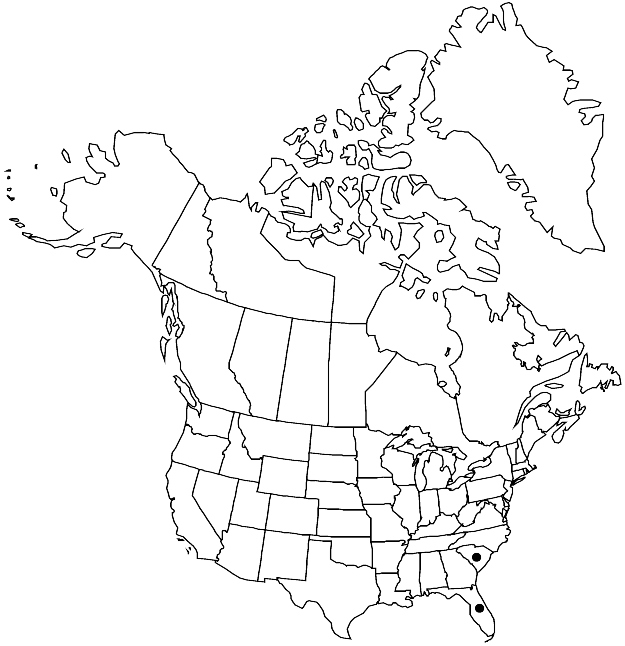Difference between revisions of "Cleome rutidosperma"
in A. P. de Candolle and A. L. P. P. de Candolle, Prodr. 1: 241. 1824.
FNA>Volume Importer |
imported>Volume Importer |
||
| Line 8: | Line 8: | ||
}} | }} | ||
|common_names=Fringed spiderflower | |common_names=Fringed spiderflower | ||
| + | |special_status={{Treatment/ID/Special_status | ||
| + | |code=I | ||
| + | |label=Introduced | ||
| + | }} | ||
|basionyms= | |basionyms= | ||
|synonyms={{Treatment/ID/Synonym | |synonyms={{Treatment/ID/Synonym | ||
| Line 28: | Line 32: | ||
|elevation=0-200 m | |elevation=0-200 m | ||
|distribution=Fla.;S.C.;tropical Asia;Africa;introduced also in Mexico;West Indies;Central America;South America. | |distribution=Fla.;S.C.;tropical Asia;Africa;introduced also in Mexico;West Indies;Central America;South America. | ||
| + | |introduced=true | ||
|discussion=<p><i>Cleome rutidosperma</i> has sometimes been misidentified as <i>Hemiscola aculeata</i> (<i>Cleome</i> aculeata); it lacks the nodal spines of that species.</p> | |discussion=<p><i>Cleome rutidosperma</i> has sometimes been misidentified as <i>Hemiscola aculeata</i> (<i>Cleome</i> aculeata); it lacks the nodal spines of that species.</p> | ||
|tables= | |tables= | ||
| Line 51: | Line 56: | ||
|publication title=in A. P. de Candolle and A. L. P. P. de Candolle, Prodr. | |publication title=in A. P. de Candolle and A. L. P. P. de Candolle, Prodr. | ||
|publication year=1824 | |publication year=1824 | ||
| − | |special status= | + | |special status=Introduced |
| − | |source xml=https:// | + | |source xml=https://bibilujan@bitbucket.org/aafc-mbb/fna-data-curation.git/src/bb6b7e3a7de7d3b7888a1ad48c7fd8f5c722d8d6/coarse_grained_fna_xml/V7/V7_301.xml |
|genus=Cleome | |genus=Cleome | ||
|species=Cleome rutidosperma | |species=Cleome rutidosperma | ||
Revision as of 00:55, 28 May 2020
Annuals or perennials, 30–100 cm. Stems sparsely branched, (often decumbent); glabrous or glabrescent to slightly scabrous (sometimes glandular-pubescent). Leaves: stipules 0–0.5 mm; petiole (winged proximally), 0.5–3.5 cm; leaflets 3, blade oblanceolate to rhombic-elliptic, 1–3.5 × 0.5–1.7 cm, margins entire or serrulate-ciliate, apex usually acute to obtuse, sometimes acuminate, surfaces with curved hairs on veins abaxially, glabrous adaxially. Racemes 2–4 cm (8–15 cm in fruit); bracts trifoliate, 10–35 mm. Pedicels 11–21 mm (18–30 mm in fruit). Flowers: sepals yellow, lanceolate, 2.5–4 × 0.2–0.3 mm, margins denticulate, ciliate, glabrous; petals white or purple-speckled (2 central ones with yellow transverse band abaxially), oblong to narrowly ovate, 7–10 × 1.5–2.3 mm; stamens yellow, 5–7 mm; anthers 1–2 mm; gynophore 4–12 mm in fruit; ovary 2–3 mm, glabrous; style 0.5–1.4 mm. Capsules 40–70 × 3–4 mm. Seeds 4–25, reddish brown to black, reniform, 1–1.5 mm, arillate.
Phenology: Flowering ± year-round.
Habitat: Roadsides, vacant lots, canal banks, lawn edges in sun or shade
Elevation: 0-200 m
Distribution

Introduced; Fla., S.C., tropical Asia, Africa, introduced also in Mexico, West Indies, Central America, South America.
Discussion
Cleome rutidosperma has sometimes been misidentified as Hemiscola aculeata (Cleome aculeata); it lacks the nodal spines of that species.
Selected References
None.